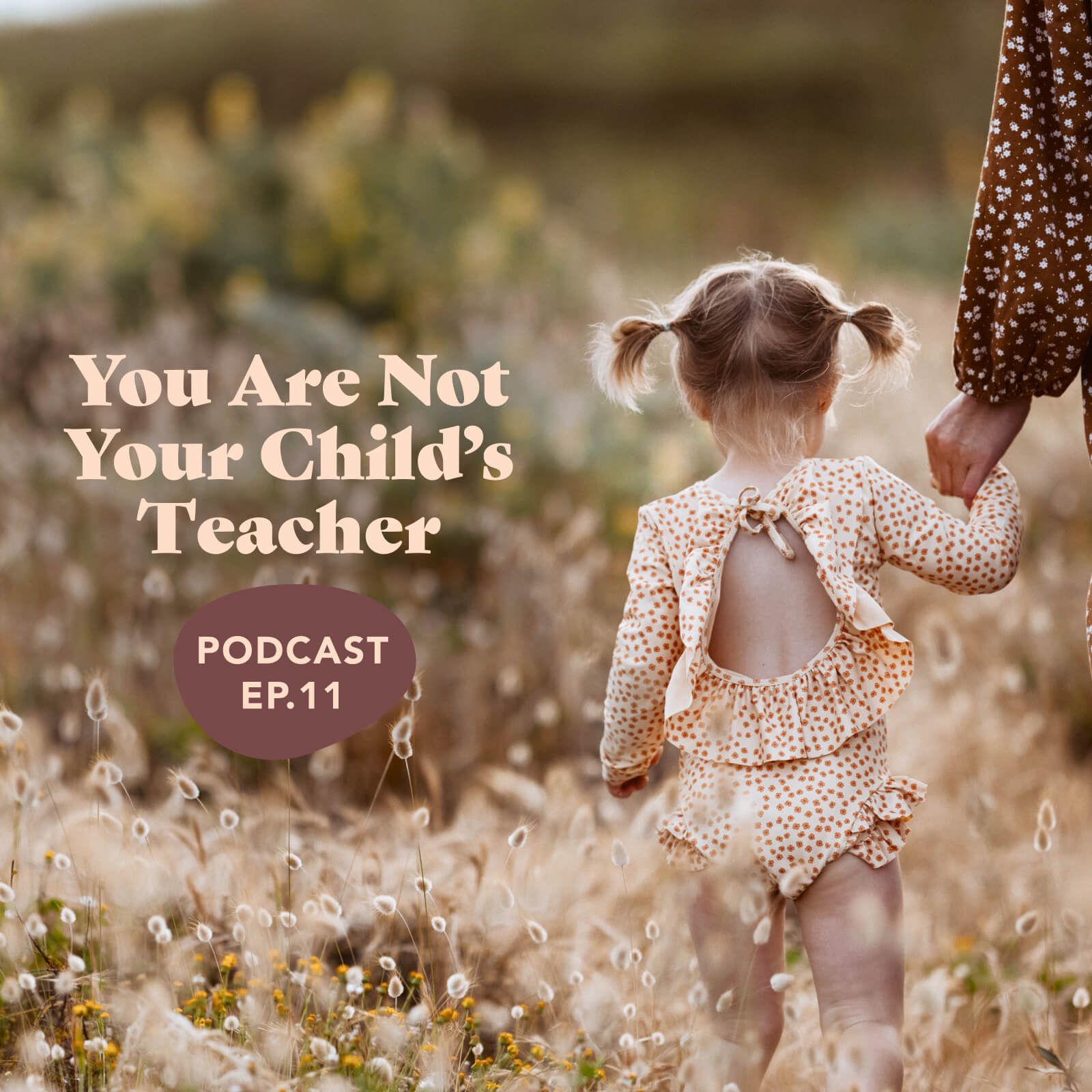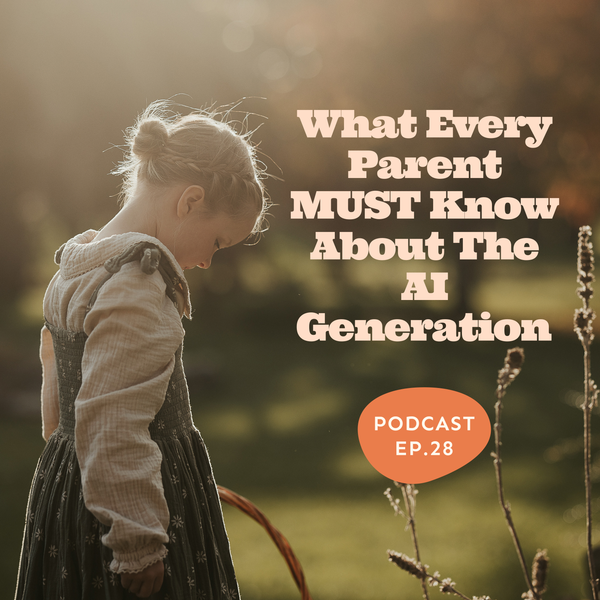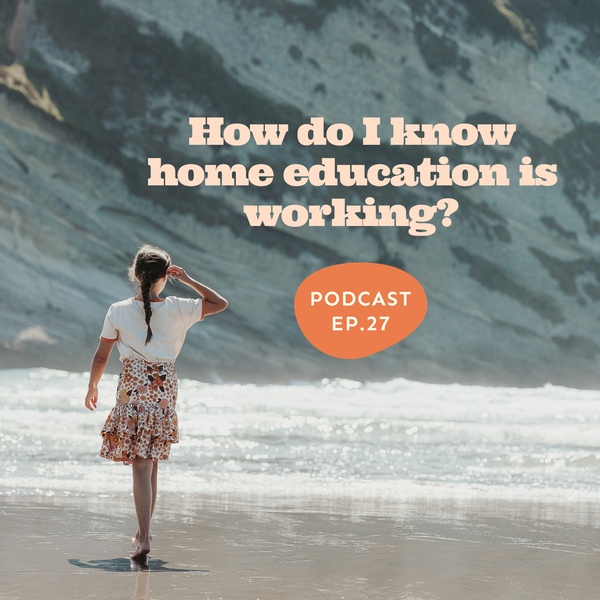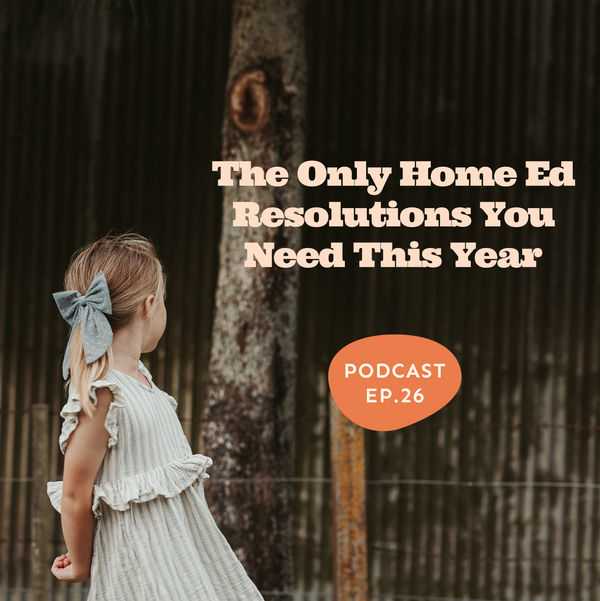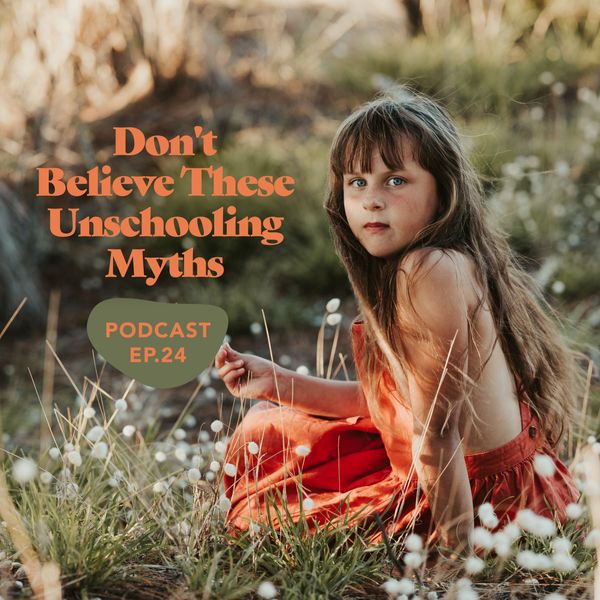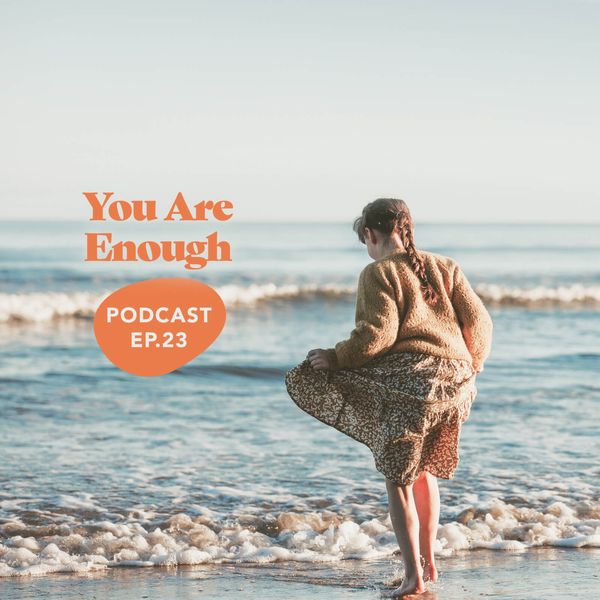Home educating parents often put a huge amount of pressure on themselves to perform the role of being a teacher, and in this episode I want to talk through why I believe the stress, tension, and feelings of failure that so often come from that are unnecessary.
First, we’ll talk through four reasons why I believe it’s a mistake to try and be a teacher to your home educated child. Then, we’ll talk through some different ways of thinking about the role you can play instead.
My hope is that by the end of this chat you’re able to free yourself of the pressure, expectation and tension that can come from trying to be both a parent and a teacher.
These private episodes go even deeper, backed by research, the science of how children learn and grow, and more than a decade of lived home educating experience. Each one is designed to help you rethink, reframe, and recalibrate the way you're walking this path, giving you the confidence to live the version of life you want. The Collection is 23 episodes strong and counting, with over 10 hours of listening available right now.
As a subscriber, you'll also get immediate access to my self-paced course, expert-led masterclasses recordings, five downloadable guides, our school exemption documents, and more 💛
Show Notes
Check out John Taylor Gatto – Dumbing Us Down on Amazon.
Complete Transcript
INTRO
Helloooo and welcome to the Life Without School podcast, here to help you and your children live the life you want to, not just the one you’re told you should.
I’m Issy, a writer and unschooling dad from New Zealand.
You can find more about me at starkravingdadblog.com – all of my posts, podcast episodes, and short films created to encourage, support and reassure anyone walking this road less travelled.
Thank you so much for tuning in to listen today. Alright, let’s get into this week’s episode.
MUSIC
Hello hellooooo, it’s lovely to have you here, so thank you for listening today.
I want to cut straight to some real talk: as the parent of home educated children I still find myself hoping they’ll outperform their school peers academically, despite believing the measures and benchmarks are irrelevant. Not all the time, not by a long shot, but that feeling bubbles up now and then.
Why?
To prove to others that the path we’re taking ‘works’?
To prove that…to myself?
To prove that…I’m capable, as an educator, and that I can do this?
A blend of those things, I think. Sometimes the feeling scares me. But then the road less travelled usually is a bit scary.
As home educating parents we’ve chosen to walk away from a childcare system that someone else takes point on running – from when that fifth birthday cake is cut through to the start of adulthood. We’ve turned our back on one of the world’s core social norms. We’ve made the choice to give up a significant chunk of potential income. We’ve waived the right to hand over any responsibility for our children’s progress in life.
We’ve put all that squarely on our own shoulders, often in the face of disbelief, criticism and finger-wagging from both people we know and people we don’t. We’ve done that because we believe the very essence of childhood is crying out to be redefined, and that it will only happen if enough parents choose to help ignite the fire of change. I think we’re brave and we’re bold, just like all the other home educating families out there.
But we’re also human, and the social pressure to succeed against all those normal progress measures can be overwhelming. And it’s something that falls out of that that I want to zero in on today: the fear of not being qualified, or good enough, to teach your child.
Home educating parents often put a huge amount of pressure on themselves to perform that role of being a teacher, and today I want to talk through why I believe the stress, tension, and feelings of failure that often come from that are unnecessary. Why I don’t believe it has to be the way it often is.
Why I believe we are not our children’s teachers. And, the role I think we should focus on filling instead.
So we’re going to dig into all that. First, we’ll talk through four reasons why I believe it’s a mistake to try and and be a teacher to your home educated child. Then, we’ll talk through some different ways of thinking about the role you play.
My hope is that by the end of this chat you are freed of the pressure, expectation and tension that so often comes with trying to be a parent and a teacher.
Right, let’s dig in shall we?
MUSIC
Ok, so first, let’s talk through four reasons why I believe we should very rarely be putting on that teacher hat.
1) Your child probably doesn’t want you to
As a parent, your child looks to you, and needs you, for a lot of things. From the moment they’re born you feed them, care for them, and keep them safe. You laugh with them when they’re happy, and you hug them when they’re sad. You play with them, and encourage them, and support them. You introduce them to new and interesting things, and you follow along with their interests.
You don’t pressure them to do things they don’t seem ready for. You just encourage and support them until they are. You don’t really teach them.
But when a child starts getting a bit older – you know, that kind of 5-6 year old age bracket when they’d normally be starting school – we start feeling that pressure to make sure they’re keeping up with all the normal expectations and measures. And because of that, we go through a fairly sudden and quite significant shift in our relationship with them. We go from just encouraging them to explore the world around them on pretty much their own terms to telling them that *we’ll* now be deciding how they’ll do that. We shift from someone who they see as helping them learn what they’re naturally leaning into, to someone telling them what they’ll be learning – whether they see importance in it or not.
Why do we do this? It’s not because we need to – the supportive, encouraging role we’ve been playing up until this point has been working perfectly well. Our child has learned to do all sorts of important and difficult things with us by their side. Why, suddenly, must we step out in front of them, put up our hand, and say – ok, to move forward you will now need to be taught.
To your child, that’s incredibly jarring. You’ve completely switched the role you play in their life, and they – understandably – react to it in all sorts of ways. Not many of them very positive.
You’ve always been there to support them, and encourage them, and keep them safe, and to guide them. That’s what your child wants from you.
And that’s what you should give them.
SHORT MUSIC
2) You’re probably not trained to teach, and that’s probably a good thing
Just as a quick caveat to this section. I’m not a teacher myself – and I have never trained as one. But my wife has – she was a music graduate who went on to Teacher’s College and become a primary school teacher here in New Zealand. So while I don’t have that professional background myself my wife absolutely does, so her experience has been really helpful to draw on here.
Being a trained teacher involves a lot of things. It’s a skilled profession that takes study, and preparation, and a qualification – but it’s important to understand that that preparation is not all focused on children, and the way they learn, and how we can best encourage and foster that. That’s a solid part of it, of course, but a significant amount of energy – by necessity – goes into areas like understanding the history of education, the politics of education, classroom management, rostering, behavioural management, curriculum delivery, testing, marking, assessment…the list of things a teacher spends time on during their training is quite varied.
Now, all those things are necessary if you want to stand in front of a classroom full of kids and deliver a curriculum to them on time, and with good results. But if that’s not what you’re trying to do – which, as a home educating parent, you’re not – most of those skills just aren’t necessary.
I think if you asked most teachers what it is that slows down or prevents children’s learning the most…they’d tell you it’s all the layers and testing and bureaucracy that just get in the way of them working closely and patiently with their students.
And if you asked them what the ideal learning scenario would be, I don’t think they’d tell you it had anything to do with teaching. I think they’d tell you it has everything to do with the child being ready to learn, being open to learn, and the physical and mental environment being conducive to it.
If you read anything by John Taylor Gatto – the famous, award winning New York school teacher of over 30 years, and author of books tearing apart the system he spent most of his professional life in – you’ll find him talking about the profession of teaching in a very interesting way. His experiences – in a number of different schools, across both wealthy and very poor areas – led to the conclusion that his teaching was standing in the way of his students learning. That he was diminishing his student’s ability to develop to their full potential. And so he started finding ways – limited ways, of course, because he still had to work within the system – of giving his students the space, resources and encouragement to educate themselves. He talks about this idea of enabling his students to be their own teachers.
After all those years of experience, and testing, and refining, he ended up believing this: That teaching is not like the art of painting – where you add a material to a surface to improve it – but that it is more like the art of sculpture – where by subtracting material, the image that was already there in the stone emerges. That is, he dropped the idea that he was an expert whose job it was to fill children’s heads with his expertise, and instead realised that his role was to remove obstacles that prevented the inherent genius of that child from developing.
If you want to hear more of Gatto’s thoughts – and again, this is a man who during his teaching years was named the New York Teacher of the year – start with his book called Dumbing Us Down. I’ll link to a copy on Amazon in the show notes to make it easy to grab it. It’s an intense read, but it’s very interesting.
I’ll end this point by saying again what I’ve said in a previous episode about my wife’s experience as a primary school teacher. She very quickly learned that her classroom-oriented training would not translate to a successful, balanced, happy, motivated home educating environment. It didn’t take her long at all to completely drop almost every element of her formal training when it came to helping our own children learn.
I’ve said this before, and I’ll say it again…not only do you not need any formal training to home educate your children, not having any will probably even help.
SHORT MUSIC
3) Trying to teach your child is probably not the most effective way for them to learn
The cognitive science is quite clear – unless someone is open, and ready, and interested in receiving what they’re being presented with, trying to teach them something will be a slower, more painful experience for everyone.
John Holt says that ‘memory is not a mule that can be made to walk by beating it’ – and this is exactly what we’re talking about here. You can try, and try, and try – but if your child is not ready to receive what you’re pushing out, it could not be further from the most efficient form of learning. That’s how it often happens in a classroom, because it’s impossible to deliver something tailored and unique to 20 or 30 children as and when they’re ready. But you, in your home – even if you have a few children – are in a much different position.
Responsibility, independence, and readiness are key elements to true learning. A child needs to feel some ownership over what’s happening. They need to feel connected to it, to see meaning in the result of it. And they need to be ready to dig into it. And that, usually, is at odds with the concept of being taught – because being taught is usually something that happens to you whether you like it or not.
I am living proof that this approach just doesn’t work very well. Because if I went to high school (which I did), and if I studied things like mathematics, history, chemistry and physics through to the end of my schooling days (which I did), then why am I not equipped to pass at least some of that on to a child (because, honestly, I’m not)?
Perhaps the teaching was ineffective. Or maybe I was just a poor student.
But I know it wasn’t either of those things. It was that I wasn’t ready to learn the specific aspects of those specific subjects on the specific days and in the specific times of my life they were being taught to me.
See, the most important thing is not that a teacher is standing in front of a child with skills and knowledge to impart. Showing up to be taught does not guarantee learning. It does not just happen after the relentless presenting of information.
What matters is that a child is interested, ready and engaged. That they can slow down and go back if they’re not fully grasping things. That they’re interested enough to actually want to do that. That they are free to learn in their own way, in their own time.
It is that the child can tie real life meaning to whatever it is they’re being presented with.
It is that they are truly ready and able – in that moment – to explore.
And none of that happens just because you’ve decided to show up and teach.
SHORT MUSIC
4) You probably don’t actually want to be a teacher
I don’t know about you, but I didn’t get into this whole parenting gig to be some kind of relentless knowledge dropping figure in my children’s lives. I never signed up to be the person who would tell them what, and where, and how, and why they would learn. I never signed up to deliver a curriculum, or to test and assess, or to manage schedules and progress.
What I signed up to parenthood for was to be a dad. A supporter. An encourager. A motivator. A provider.
My key roles as a parent are clear to me, and clear to my children – and anything that makes those roles harder – and stepping into those teacher shoes usually does – is a non-starter for me. Perhaps if the research, and the brain science all pointed to children learning best under conditions of traditional teaching I would feel differently. But they don’t. And so, I don’t.
I’m my children’s dad. And choosing to home educate doesn’t mean I have to try and become something I’m not.
MUSIC
Ok, so if a home educating parent decides they don’t want to adopt the role of teacher, what can they do instead? What does thinking about that differently look like in practice? Because I understand everything that sits under the fear involved in this. I really do. Like I said at the start of this episode – sometimes that worry of not doing enough, of not teaching to a high enough standard, bubbles up. But I know where it’s coming from. And I know that my children and I will miss out on a lot of true learning and connection if I give into it.
So let me be really clear, and say this – if you don’t feel qualified to teach, well – I don’t either, and I’ve been home educating for years. But the main point I want to get across today is that I also believe that’s irrelevant, because in my opinion the role we should be filling is that of a guide.
Let me show you what I mean:
Can I stand in front of a whiteboard and teach my eldest child trigonometry? No.
Can I help him find the resources he’ll need to learn applied geometry to any level, or any other branch of mathematics that interests him? Yes.
Can I recite key moments and timelines from history to teach him about our major historical events? Some, but probably less than I’d like to admit.
Can I deep-dive alongside him into any aspect of human history imaginable to broaden our understanding of where we’ve come from together? Yes.
Can I teach him about atomic structure? No, because I can’t even remember the basic differences between protons, neutrons and electrons from when I was taught.
Can we listen to engaging science podcasts and follow YouTubers performing and breaking down epic chemical reactions? Yes, and for the record this time the atomic structure stuff stuck for me.
I say this a lot – teaching and learning are very different things. I’m not trying to ensure my children are taught…I’m trying to help them learn. One is something we’re doing to them, and one is something they’re doing with our help.
And behind that difference between telling them what they’ll be learning and then teaching it to them, and understanding what they want to explore and how to best facilitate that…is the fact that no one knows our children better than us. No one knows what motivates them, what frustrates them, what drives them deeper into something than we do. No one is better placed to help our children discover the world around them in a way that works for them.
I might not be qualified to teach a classroom full of children. In fact, I most definitely am not. Like I talked through earlier – being a teacher is a skilled profession covering a whole stack of different things. But as a home educating parent, I don’t need those things. Because what I I can offer is one-on-one encouragement, inspiration, guidance, and help accessing whatever information and resources my children need to explore and learn what they’re interested in.
That I can do. That I am more than qualified for.
SHORT MUSIC
I mentioned earlier that responsibility and independence are key elements to true learning. Children learn best when they are supported in finding their way, rather than being completely directed.
There’s an interesting study where children were given a toy to play with – one they’d never seen. This toy had a bunch of hidden aspects to it. When an adult introduced a child to the toy by showing them quite clearly how to find and use some of those hidden functions, the child tended to just stick to the ones they’d been shown.
But when an adult introduced the toy as something they themselves hadn’t had any experience with, and ‘accidentally’ triggered one of those hidden functions in front of the child, the child tended to explore more deeply, and discover more of those hidden things themselves.
When you fully direct a child, you are taking away the opportunity for them to explore something on their own terms. To…write their own path through something. And we see this in classroom settings all the time. Older children who are unable to think outside the way a teacher has described or demonstrated something, because without feeling any sense of responsibility – or chance for natural discovery – our brain just sticks to what it’s been shown and told.
You can feel this when you’re playing with your child in those toddler years. You’re doing a puzzle together, for example, and you have two options – you can completely direct your child by passing them each piece and pointing at where they should go, or you can let them explore, and test, and try putting the pieces in the wrong places, and be there to gently guide them when it feels like they need you, or when they ask for you. You can just feel how much better that second approach is for their developing brain – and science absolutely backs that up. If a child has an opportunity to play a role, to bring a level of responsibility and autonomy to learning or solving whatever it is in front of them, the result will be a much more meaningful growth experience.
Knowing that – and knowing you have much more of an opportunity to be one-on-one with your child, helping them tailor their life journey to their own interests, skills and needs – it’s clear to see that the discipline of teaching – of imparting our own knowledge and approaches on our child – is not only not needed, it’s not even best.
Now, there’s an important point to make as part of all of this – and that is, having teachers in our lives is actually really important. That might sound counterintuitive based on everything I’ve just said, but hear me out. Self-directed learning, often, will lead to a place where a child’s continued progress could benefit from having someone skilled involved in some way. For example, you might have a young pianist who has developed a stack of skills on their own, but who would get a lot out of even just talking to an experienced musician. They might draw from that person in different ways – they might decide proper 1 on 1 lessons will help them build their skills faster. They might just want to connect, and share their work with that person, and get some feedback on it. This kind of scenario is teaching that is intentionally sought out for a purpose. Not, teaching that is put to the child regardless of their interest or readiness.
Where teaching – or, mentoring, as I prefer to think about it – can accelerate something for a child – something they’re already learning or developing, something they’re already interested in and excited to explore deeper – it can be really useful and powerful. And, I think it’s a bit naive to think we’ll always be able to learn anything we want, or develop any skill on the planet to our absolute maximum potential, without having good mentors in our lives at the right times.
But that doesn’t have to be complicated, or costly. In fact, there are probably a lot of mentors in your child’s life already. Whenever they go to their drama class with their tutor, or sports game with their coach, or they talk to a librarian, or a surfer they meet on the beach, or their grandparent tells them a story…they are experiencing teaching, mentoring, that they want to receive.
And mentors are not just adults. Friends, too, are wonderful teachers. Every human is different. Every human brings characteristics, and skills, and attitudes to the table that we might not have. And learning from each other – teaching each other – is a very organic thing within those sorts of relationships.
To sum up what I’m saying on this – teaching and learning do not necessarily co-exist. And perhaps they don’t more often than they do. But when a child wants to receive guidance from someone with knowledge or skills in an area they’re passionate about, and already leading their own journey in…introducing those mentor relationship layers can be incredibly powerful.
ENDING MUSIC
That cascading, often escalating worry that – you need to teach your child, but how can you possibly do that, you just don’t feel qualified, or really even want to…is probably the most common fear that home educating parents have to live with, and work to break down.
But we are not our children’s teachers. We are their carers. Their providers. Their protectors. Their supporters. Their nurturers. We are their guides.
We have a unique insight into who they are, where they might like to head, and what help they might need on the way.
Next time this worry about not teaching enough, or being qualified enough bubbles up, remember:
Being a teacher is probably not something your children need or want from you. It is probably not something you’re technically qualified to do, but you don’t need to be because you’re not trying to manage a classroom or deliver a curriculum to a large group of people. It’s probably not the best way for your children to learn, and – let’s face it – you probably don’t want to be one anyway.
If you need it, then this episode is your permission to stop stressing about this. To hang up your teacher’s hat, and focus on being the best parent – and supporter, encourager, nurturer, provider, and guide – you can be.
Because if you do that, and you pull in mentors here and there along the way, then the team you and your child will make together will be unstoppable.
Thank you, as always, for listening in today. If this episode has made an impact on your day, please leave me a review on your podcast platform of choice – or, pop over to my Facebook or Instagram feed to leave a comment on the post for this episode.
I’ll see you back here soon. Bye for now.


